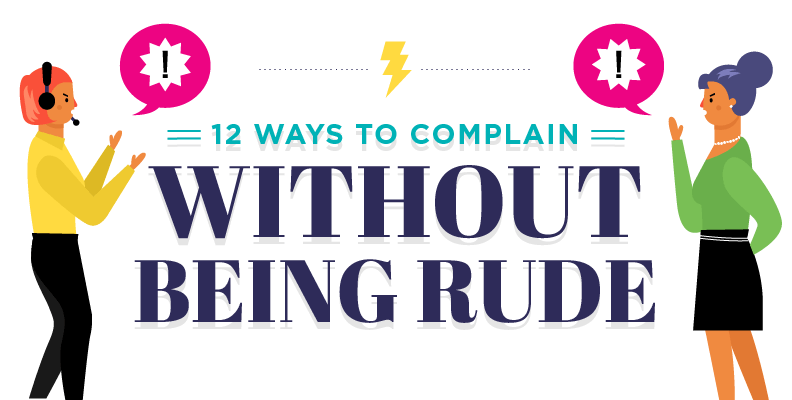Have you ever received poor service, a faulty product or an experience that completely failed to live up to the advertising? Your time and money was wasted, leaving you feeling angry or taken advantage of. But what can you do about it?
The obvious answer is to launch into a firm complaint, but research shows that 96% of disappointed consumers don’t even get that far. This isn’t surprising when you think about the frustration that so often awaits you in customer service. In fact, research suggests that 89% of people have switched companies due to their annoyance with customer service.
The key to a successful complaint lies in an old cliché: “Don’t get mad, get even.” You’ve got to keep calm and channel your outrage in the right way. That’s why we’ve put together an infographic to help guide you through an effective complaint.
Preparing yourself properly is the first move. It gives you a chance to take a step back, chill out and make sure you are going down the right path. Once you’ve ascertained that the other party truly is to blame, it’s time to make a plan and identify what you want.
From there you need to decide how you’re going to deliver your words of rebuke – and to whom. More than 90% of complainers feel that they are not taken as seriously as they should be. If your complaint is falling on deaf ears, there are a few options to increase the power you’re applying.
Social media tools platforms like Facebook and Twitter are great for putting a bit more pressure on the company, while review sites are trusted as much as personal opinions by 84% of people and can help draw attention to your situation. If you’re still getting nowhere, don’t be afraid to research your legal option.
No matter which way you approach it, staying in control and focused is vital for a successful outcome.

Sources
Afshar, V. 2015. 50 Important Customer Experience Stats for Business Leaders. huffingtonpost.com
- Customer Impact Report. oracle.com
Koetsier, J. 2014. Social media: We complain 879 million times/year (and Facebook is our top target). venturebeat.com
Varma, B. N. 2015. Complaining, for Your Health. theatlantic.com
Tugend, A. 2013. Complaining Is Hard to Avoid, but Try to Do It With a Purpose. nytimes.com
Dachis, A. 2011. How to Complain to Get What You Want (Without Being a Huge Asshole). lifehacker.com
Rabinowitz, P. Organizing for Effective Advocacy. Chapter 31. Section 7. Documenting Complaints. ctb.ku.edu
Winch, G. 2011. How to Complain to Customer Service and Win. forbes.com
Beal, A. 96% of unhappy customers won’t complain to you, but will tell 15 friends. trackur.com
Filing a Consumer Complaint. usa.gov
Better Business Bureau. bbb.org
- State of Global Customer Service. microsoft.com
Alcock, W. 2016. How to Complain. moneysavingexpert.com
Cost of Customer Complaints. customerchampions.co.uk
Su, A.J. 2016. 3 Ways to Stay Calm When Conversations Get Intense. hbr.org
Winch, G. 2012. The 9 Habits of Highly Effective Complainers. psychologytoday.com
Goodman, J. 1999. Basic Facts on Customer Complaint Behavior and the Impact of Service on the Bottom Line. Competitive Advantage. June.
Hussey, M. 2015. Your customer service team should never say these things. thenextweb.com
Bureau of Consumer Protection. ftc.gov
Tuttle, B. 2015. 10 Funniest & Most Creative Consumer Complaints Ever. time.com
- Local Consumer Review Survey. brightlocal.com
Embed This Image On Your Site (copy code below):






